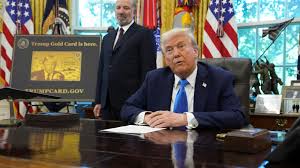On August 26, US Federal Board member Lisa DeNell Cook was struck with charges by President Donald Trump. A day after the initial charges, Cook responded with a 24-page lawsuit against Trump to protect her job, starting a constitutional conflict.
In 2022, Cook became the first black woman to be elected by former President Joe Biden onto the Board of Governors of the Federal Reserve System, as reported on The Guardian. This board, commonly known as the Federal Reserve Board, is a highly prestigious institution and is responsible for the overall management of the US economy.
Cook’s lawsuit was in response to both her attempted removal from the Federal Reserve Board and a social media post made on Truth Social by Trump. Her attempted removal was made due to allegations of mortgage fraud, which Cook minimally commented on, hinting at it as a “clerical error” in terms of her property declarations. The primary subject of the lawsuit was the potential violation of Cook’s right to due process, claiming that she was unlawfully fired due to inaccurate allegations with no proper justification.
“President Trump does not have the power to unilaterally redefine ‘cause’ – completely unmoored to caselaw, history, and tradition – and conclude, without evidence, that he has found it,” Cook’s attorneys said in their primary legal document.
The actual claims made by Trump and his attorneys are based on the two properties that Cook filed as her primary place of residence, an error that could be counted as mortgage fraud. According to President Trump, Cook pledged on her mortgage documents that with both her Ann Arbor and Atlanta homes, she would live in each for a year in the same year. Despite these accusations, Cook continues her claims that these allegations serve to “fill and forward his agenda to undermine the independence of the Federal Reserve,” as reported on PBS.
“If we’re going to allow politics to determine the membership of the Fed, what does that mean for the future of our economy?” James Manners, an associate professor at Fordham Law, commented on CNN.
In addition, Kush Denai, the deputy press secretary to the president, claims Trump was justified in his attempts to fire Cook, according to CBS: “The President determined there was cause to remove a governor who was credibly accused of lying in financial documents from a highly sensitive position overseeing financial institutions.”
On August 29, US District Judge Jia Cobb spent her morning reviewing the case. Both sides of the argument continued to pressure Cook but stood at a stalemate.
“Deferential doesn’t mean that there’s no probing of it, you just assume good faith, you defer,” Cobb said after listening to DOJ attorney Yaakov Roth’s argument that the court had no right to argue Trump’s decision, according to CNN.
On September 2, Cook’s lawyers presented a signed document to the court, which included over 600 credible economists, each one pledging their case as a trustworthy person. Within this document, several economists cite the 1914 Federal Reserve Act as a cause to deny Trump’s decision. This act detailed the workings of the general federal board, making sure to add how the board should be “insulated from day-to-day politics,” as indicated by the Federal Reserve.
Currently, the Federal Reserve is still in the court battle, responding to Trump’s allegations against Cook. The lawsuit continues to be debated amongst the two branches, raising questions about Cook’s position on the Board.













































































































































